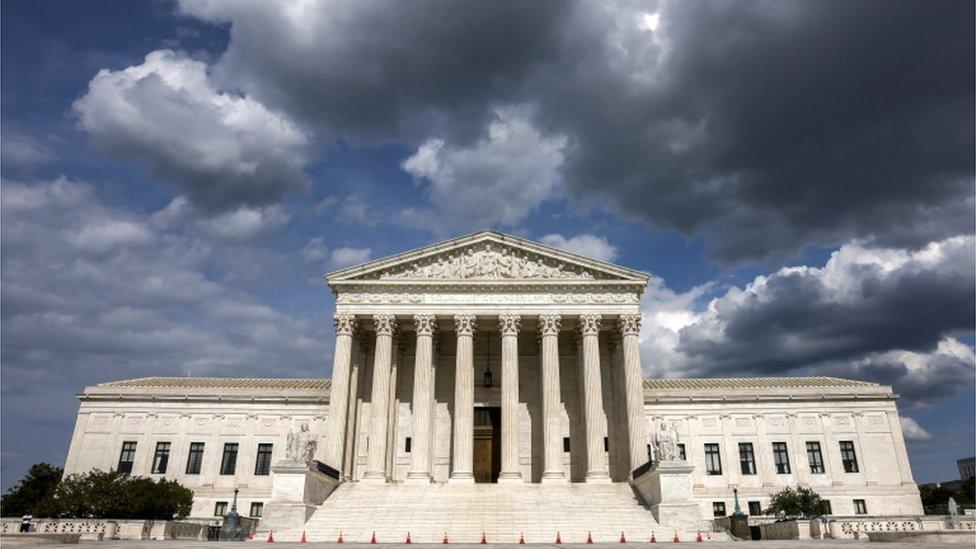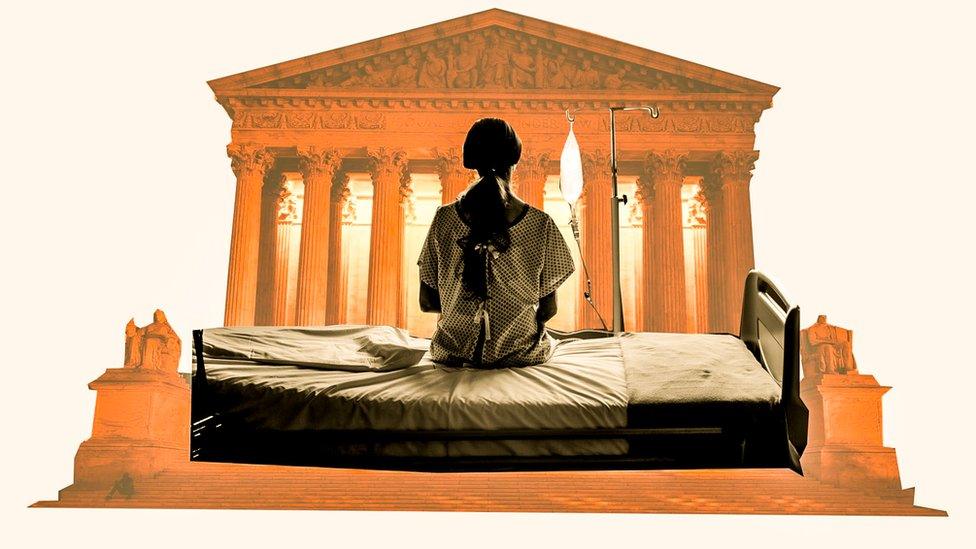US Supreme Court rejects Trump-backed challenge to Obamacare
- Published

The court upheld the law by a 7-2 majority
The US Supreme Court has rejected a Trump-backed challenge by Republican-led states to former President Barack Obama's healthcare overhaul.
Despite the court's conservative tilt, its nine justices ruled by 7-2 that the challengers did not have legal standing to sue.
It is the third time since 2010 that the Affordable Care Act (ACA), known as Obamacare, has survived a challenge.
The law gave millions of low-income Americans access to medical insurance.
It bans insurers from denying coverage due to pre-existing conditions.
Thursday's ruling did not address the question of whether a key provision in the law was unconstitutional.
The legal challenge from Texas and 17 other Republican-governed states had been backed by former President Donald Trump, who promised to have the act repealed when he was elected in 2016.
Republicans tried and failed to overturn the law in Congress when they controlled both houses and in the courts on numerous occasions.
Earlier this month, the White House said a record 31 million Americans were now covered by healthcare under the ACA.

Obamacare's future looks secure

Conservative groups, led by the Republican-controlled state of Texas, were essentially trying to get the entirety of the Affordable Care Act killed on a technicality. By a comfortable 7-2 vote, the justices of the Supreme Court kicked their case to the kerb.
The court didn't even bother to rule on the merits of Texas' arguments, instead holding that the litigants lacked the standing even to bring the case.
The ruling suggests that while this court is decidedly more conservative than the one that narrowly upheld Obamacare in a highly charged 2012 decision, there's simply nowhere near a majority of justices interested in reversing that ruling, even if they disagreed with it at the time.
This was the third case seeking to dismantle Barack Obama's signature healthcare reform to reach the Supreme Court - and the law has been sustained by a growing majority each time.
While the conservative bent of many lower federal courts means future challenges could still get a toehold in the judicial system, it's increasingly clear that the Supreme Court - the nation's ultimate legal arbiter - has no interest in striking down the law.
Given that attempts to roll back the legislation in Congress have failed as well, the future of Obamacare now appears secure.

What did the court decide?
Thursday's ruling left in place an Obamacare requirement known as the "individual mandate" - a provision instructing people to buy health insurance or face a tax penalty. But it's no longer much of a penalty: in 2017, a Republican-led Congress set the fine to $0.
The 18 Republican states involved in the suit argued that the law became unconstitutional once the penalty was eliminated.
The majority opinion was written by Stephen Breyer, the most senior liberal justice on the court.
He wrote: "The matter is not simply technical... It would threaten to grant unelected judges a general authority to conduct oversight of decisions of the elected branches of Government."

Since it was passed, Obamacare has been a partisan lightning rod, inspiring protests and lawsuits
Conservative Justice Samuel Alito dissented from the majority, along with one of Mr Trump's appointees, Neil Gorsuch.
"No-one can fail to be impressed by the lengths to which this Court has been willing to go to defend the ACA against all threats," Mr Alito wrote.
The ruling comes from the most conservative Supreme Court benches in decades, after former President Trump, a Republican, nominated three justices in his four-year term.
What has the reaction been?
President Joe Biden applauded the news in a statement, calling the ruling a "major victory for all Americans benefitting" from the law.
It is also a win for Mr Biden himself, who has made improved healthcare access central to his agenda and has promised to use his executive powers to expand the ACA.
"It is time to move forward and keep building on this landmark law," he said.
Former President Obama also weighed in, saying in a statement that the ruling reaffirmed that his signature legislation is "here to stay".
To Republicans, the ACA represents a drastic - and costly - move towards socialised healthcare. They argue it increases expense but lowers the quality of care. It has also been unpopular among the already-insured who saw coverage costs rise when sicker individuals were added to the pool.
In a tweet, Congressman Kevin Brady, a Texas Republican, said he was "disappointed" by the ruling and criticised the Supreme Court for having "stepped in" to save the "flawed" legislation.
But the law remains well-liked by many Americans - nearly 54% viewed it favourably, a February Kaiser Family Foundation poll found - and it has become increasingly intertwined with the country's healthcare system as a whole.
The act's rules barring insurers from denying coverage over pre-existing conditions and allowing children to stay on their parents' health plans until age 26 are among its most popular elements.
Related topics
- Published18 October 2020

- Published13 July 2017

- Published17 October 2018
